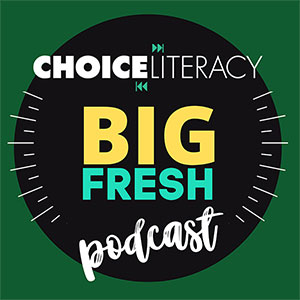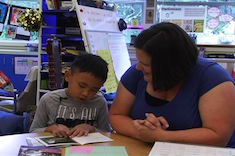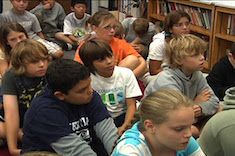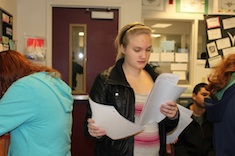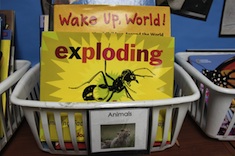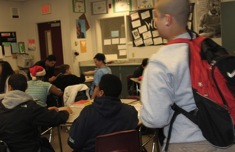Jen Schwanke
All Content
Let’s Upskill: How to Revive and Transform Instruction to Serve Today’s Learners
Jen Schwanke offers clear and practical steps teachers can take to modernize how to meet the needs of today’s students. Following these steps will help ward off the risk of being too comfortable in old routines.
How to Respond When Books and Curriculum Resources Are Challenged
Jen Schwanke addresses the fact that educators, books, and curriculum resources are under increased scrutiny. She offers practical and wise steps to take when resources are questioned by concerned stakeholders.
Books for Literacy Leaders
Jen Schwanke suggests five books that will enrich a leader’s skills by solidifying their approach to the important work of evolving our instructional practices.
Avoiding Burnout
Jen Schwanke offers advice to fight against burnout.
Choice, Voice, and Rejoice: Looking Back and Looking Forward
Jen Schwanke encourages educators to reflect on the positive ways the school year has unfolded.
Conventions Podcast with Jen Schwanke
Jen Schwanke joins the podcast to discuss conventions.
A Word to Aspiring Coaches
Principal Jen Schwanke offers encouragement for teachers considering an instructional coach position.
Books Need Space
Jen Schwanke gives advice to literacy leaders about organizing and humanizing books in a school book room.
Editing to Consolidate
Jen Schwanke outlines ways to make substantial cuts to a draft in order to have confidence in the clarity of a message.
Hidden Treasures II Podcast with Jen Schwanke
Jen Schwanke shares insights about leading a school with hope and grace during COVID.
The Daily GIF
Jen Schwanke encourages leaders to consider how to give a daily boost of morale.
COVID: What I’ll Keep
Jen Schwanke reflects on the things she’ll keep after a year of pandemic teaching.
Coaching for All
Jen Schwanke believes in the importance of leaders seeking a coach in order to remain sharp as a professional. She offers three identifiers to know it’s time to find a coach.
Flipping Negative Stressors
Jen Schwanke shares tools and tips for dealing with professional stress, from flipping negative emotions to finding ways to move forward with energy.
Learning Standards: No Best Way
Jen Schwanke provides some critical questions for teachers to ask when they are interpreting a standard and bringing it to life with students.
Student Moves
Students move from our school districts to ones next door all the time. How can school leaders ensure the moves are as seamless as possible, especially in the realm of literacy? Jen Schwanke shares a case study of how a meeting and transfer of files made all the difference for one struggling learner.
Home Language Is Love Language
Our names are such a big part of who we are. Jen Schwanke reassures a teacher who struggles with student names, and at the same time gives her practical tips for making sure her pronunciations are correct.
Second Chances
Jen Schwanke rethinks her writing process for sending information out to families and others. Her “one little change” might get you rethinking how you draft and share weekly newsletters.
Competitive Comparisons
Jen Schwanke explores the insecurities and fear that can set in when teachers tackle distance learning, as well as how to overcome them.
Remote Learning for Our Youngest Students
Jen Schwanke reflects on the challenges of helping our youngest learners with distance learning, and shares examples of how teachers she works with are meeting them.
Letting Go in the Remote Learning World
Jen Schwanke, like many of us, is scrambling to deal with issues cropping up in the new world we all face of remote instruction. She shares some of the most common problems, and how teachers might deal with them.
Literacy, Phys Ed, and Workshops Across the Curriculum
Jen Schwanke is surprised when a terrific language arts teacher switches to physical education, until she realizes that workshop instruction is good teaching in almost any subject area.
Trauma and Literacy
Jen Schwanke remembers her own experiences with trauma as a scared young girl, and how one kind teacher made all the difference in putting her on the path to healing. This makes her ponder the power of literacy in reaching wounded students in our midst.
Beyond a Checklist for Teaching and Leading
Jen Schwanke explains why judging a teacher solely on whether they follow literacy workshop tenets may cause us to miss some essential (and elusive) qualities of great teaching . . . and leadership.
Student Files
To read or not read the student file? Some teachers are strong believers in “fresh starts” for all the children in their class, and never look at cumulative records. Jen Schwanke explains how these best of intentions can sometimes do damage.
The Toll of Constant Interruptions
An accomplished teacher is at her wit’s end because of constant interruptions. She seeks help from her principal, Jen Schwanke. They soon discover it’s a schoolwide issue that needs to be addressed.
Read Alouds for Big Kids
Jen Schwanke reflects on the power of read alouds for older students, and how school leaders can help teachers and parents value them too.
Speed Reading
Adolescent learners can face daunting reading loads in high school that they need to tackle at home. Jen Schwanke has tips for how teachers and parents can work together to help teens develop strategies for dealing with a lot of complex reading quickly.
Strategies for Sustaining Student Attention
Jen Schwanke shares some strategies for sustaining student attention beyond just calling out a student’s name over and over and over again.
Forgetting and Remembering
In the end classroom management often comes down to students valuing the same things we do. Jen Schwanke has tips for how high school teachers can create a culture where there is better communication and more shared values.
Heavy Edits
Jen Schwanke explains why the best way to improve your communication with families may be to use fewer words.
Helping Teachers Write
Teachers often ask a principal or coach to read a draft or help with writing. What do you do when the adult writer needs a lot of guidance? Jennifer Schwanke finds herself in this position, and considers the moves she makes.
Helping Students Develop Conversational Identity
Jen Schwanke writes about the challenges of helping students develop conversational identities, providing prompts to help teachers reflect on their strengths and needs in fostering talk in classrooms.
Stepping Away from the Conversation
Jennifer Schwanke explains why sometimes the best thing teachers can do to foster better conversations in their classrooms is to step away and let the talk unfold among students.
Staff Retreat
The last thing leaders want to do when they are rushing to get everything done at the end of the school year is plan for summer retreats. But Jen Schwanke explains why that’s exactly what needs to happen if the sessions are going to be thoughtfully done and inclusive.
Spring Cleaning
Jennifer Schwanke shares some quick tips for spring cleaning of classrooms and literacy supplies.
Coaching Minute: Principals and Questions
In this quick video, Jen Schwanke explains why the most essential task for a new principal or literacy leader may be to slow down and ask lots of questions.
Coaching Minute: Fostering Team Collaboration
Jen Schwanke talks through the tricky work of making sure literacy specialists, coaches, and classroom teachers have the time and structure they need to collaborate well around students and data.
Defining the Principal’s Role
Jennifer Schwanke talks about the importance of school leaders building a sense among teachers and families of how literacy is the foundation for all learning in classrooms.
Conferences with Parents of English Language Learners
Jen Schwanke and Stella Villalba share practical tips for conferring with parents of English language learners.
An All-School Writing Project: Six-Word Memoirs
If you want to bring everyone in your school together around writing, you can’t beat the simplicity and fun of six-word memoirs. Jennifer Schwanke describes how she sparked enthusiasm for the project in her school.
Conferences Between Middle School Parents and Teachers
Parents of middle school students are often bewildered at how best to deal with their child’s unresponsiveness. Jennifer Schwanke explains how teachers can construct conferences with middle school parents that foster reflection, action, and shared goals.
Classroom Visit Protocols
Jennifer Schwanke shares tips for ensuring your classroom visits aren’t unexpected or unwelcome.
Book Study
Jennifer Schwanke creates a more organic, choice-driven process for book study groups in her school.
Avoiding Flat Tires
Jen Schwanke gets berated by a tire shop repair guy for ignoring routine maintenance needs on her bike. That gets her thinking about what needs routine maintenance in elementary classrooms.
Literacy Audit (Part 6): Becoming a Literacy Ambassador
Jennifer Schwanke concludes her literacy audit series with ideas for how you can become the biggest advocate and cheerleader for literacy in your school.
Literacy Audit (Part 4): Building a Strong Team
We continue our series on literacy audits. Jennifer Schwanke explains why it is essential to build a strong team if you want to see real change after completing an audit and deciding on next steps.
Literacy Audit (Part 5): Providing Resources and Support
Jennifer Schwanke continues her series on literacy audits. In this installment, she takes on the challenge of matching limited resources and time to nearly unlimited needs.
Literacy Audit (Part 3): Making a Plan
We continue our series on taking a literacy audit. In this installment, Jennifer Schwanke describes a process for developing a plan to improve literacy practices once you've identified areas of need.
Literacy Audit (Part 2): Taking Your School’s Pulse
Jennifer Schwanke continues her series on literacy audits. In this installment, she provides some key questions for taking the "literacy pulse" in your school.
Literacy Self-Audit (Part 1): Beginning Questions
Jennifer Schwanke shares questions for beginning a reflective analysis of your strengths and needs in literacy.
Auditing Your Literacy Leadership: Introduction
Jennifer Schwanke begins a new summer series on doing a self-audit of your literacy leadership and your school's needs. This is a great tool for reflection and planning for the new school year. In this introduction, Jen explains why this auditing and reflection is essential work.
Coaching Minute: Rethinking Time
Jennifer Schwanke finds that one of the biggest changes in moving from teaching to leadership is control (or lack of it) over her time.
Rethinking Spring Assessments
It's May, and teachers everywhere are preparing for final assessments of students. Jennifer Schwanke explains why it might be time to rethink or even ditch some of those plans.
Talking in Front of Peers
Jennifer Schwanke realizes it is never easy to talk in front of adults. She explains how she helps teachers accept the challenge of speaking to colleagues in professional development settings.
When Email Isn’t Enough
Jennifer Schwanke finds that sometimes email can't take the place of face-to-face interactions. She explains why she doesn't let a quest to save time override consideration of when meetings are needed.
Leadership Shifts
This is the time of year when principals and literacy coaches are weighing which teachers might take on leadership roles next year and which teachers in leadership roles might be relieved of these duties. Jennifer Schwanke shares her process for this delicate work.
To Celebrate or Not
One parent is adamant that Black History Month should be celebrated. Another parent is adamant that observing Black History Month trivializes blacks. What's a literacy leader to do? Jen Schwanke brings up the thorny issues involved during a staff meeting.
Students Watching Teachers
Students are always watching us, whether we realize it or not. Jennifer Schwanke explains how we can capitalize on that interest to build independent reading and writing habits.
Questions for Rereaders
Lifelong readers often have books they love to reread, sometimes more than once. But young readers can also get into ruts. Jennifer Schwanke explores when rereading is fine for students, and when it should be challenged. She includes a series of questions for teachers to use when conferring with children who are rereading favorite books.
Why Bother? Practical Answers to Questions About Close Reading
Why bother with close reading? Jennifer Schwanke finds many teachers asking themselves if close reading is worth the time, when schedules are already overstuffed. She shares some prompts to help assess when close reading makes sense.
Better Team Meetings
Are your team meetings welcoming? Jennifer Schwanke describes how one team leader created a happy, thriving, and safe space for team gatherings.
Better Parent-Teacher Conferences
Jennifer Schwanke explains how she stopped railing against the tradition and learned to appreciate parent-teacher conferences. She shares tips for making them better.
Speech/Language Pathology and Literacy: Making Connections
Jennifer Schwanke explains why she routinely consults with a speech and language specialist for insights into reading and writing difficulties a student may be experiencing.
Evaluation Season
Jennifer Schwanke shares the challenges of having honest conversations with teachers during evaluative sessions, acknowledging that her performance is being judged as well.
Breathe
Jen Schwanke resists giving time over to a teacher for an unplanned activity before a meeting she knows will be challenging. Afterward, she realizes the value in pausing to remind everyone what matters most in our work.
Making Meetings Purposeful
From identifying intent to setting personal norms, Jen Schwanke shares her key principles for leading meetings that participants won't hate.
Getting Emotional
It happens at least once a year for Jennifer Schwanke: she finds herself on the verge of crying in a professional setting. Here's her best advice for literacy leaders to keep the tears at bay.
Allocating Services
Jennifer Schwanke shares principles for leading those awkward meetings when staff need to decide between too many students who need a finite amount of services.
School-to-Home Journals
Are you considering school-to-home journals in your classroom this year? Jennifer Schwanke describes how these notebooks build community and literacy skills.
The Awkward Chair
Jennifer Schwanke explains how literacy leaders are often in "the awkward chair"—the position of having to explain painful truths to others. She has tips on how to handle the hot seat in meetings and discussions with colleagues and parents.
Professional Reboot
Jennifer Schwanke finds she is jealous of a colleague attending a summer training session, so she attends herself. It's a reminder to her of how powerful professional development can be for school leaders.
The iPad Is 7
Jennifer Schwanke reflects upon how the iPad and other touchscreen devices have changed the way children interact with all texts, even traditional storybooks.
School Leaders and Written Communication
Jen Schwanke is horrified at the quality of writing she receives when teaching a graduate course for school leaders. The experience gets her thinking about what motivates writers of all ages.
Explaining a Workshop Model to Parents (Part 2)
ennifer Schwanke explains how jargon can trip up communication with parents, and lists which terms are worth defining. This is the final installment of her series on talking about literacy workshops with families.
Explaining a Workshop Model to Parents
Jennifer Schwanke explains why parent-teacher conferences can be bewildering for families, and offers advice for better ways to explain a literacy workshop model to them.
Read-Aloud Gone Awry
Jennifer Schwanke shares her experience of having read-aloud go awry in a middle school classroom.
The Failures of a Doughnut
We can celebrate the wonders of what a doughnut can do to improve a bad day. But what it can't do is make children read more. Jen Schwanke takes on reward programs for children that may hinder more than help family relations.
Parent in a Foreign Land
Jennifer Schwanke shares some of the unique struggles parents of English language learners have in making their children's needs known, and how we can help them.
Student-Led Conferences from Many Perspectives
Jennifer Schwanke and Franki Sibberson share four perspectives on student-led conferences — teacher, principal, student, and parent.
Poetry Through Song
Jennifer Schwanke finds song lyrics are one way for students to see the power of poems.
An Unconventional Scavenger Hunt: Finding Errors
Jennifer Schwanke finds that a scavenger hunt for errors to add to a bulletin board is a great way to build editing skills and a writing community all year long in her seventh-grade classroom.
Learning Land
Jennifer Schwanke considers what she and her district learned when they adopted an online digital skill and drill program that promised more than it delivered (don't they all?). The name of the program has been changed to protect the guilty.
Replicating or Deepening?
Jennifer Schwanke finds teachers can get territorial about texts, “claiming” them for their grade level. She explores when it is appropriate to repeat the use of a text in subsequent grades.
No Special Class
A parent is adamant about her child not receiving extra support, and teachers and administrators are frustrated. Jennifer Schwanke works to understand the root of the problem.
Managing the Email Load
Jennifer Schwanke explains how she categorizes her emails and streamlines the time she spends reading them.
Old-Fashioned Resources
Jennifer Schwanke cleans out a school storage area, and with advice from teachers discovers new purposes for old items she was about to discard.
Understanding Josh: The Audio Reader
Jennifer Schwanke tells the story of Josh, a special-needs student who is almost impossible to reach, until one committed teacher unlocks the key to what makes him tick as a learner.
Parents in a Foreign Land
Jennifer Schwanke shares the poignant tale of connecting with the parents of English language learners.
New and Improved Nonfiction
Jennifer Schwanke remembers the days when mimeographed nonfiction pieces were rare and not welcome additions to elementary classrooms, and reflects on how much has changed.
The Beauty of Imitation
Jennifer Schwanke explains how concerns about plagiarism can get in the way of recognizing the value of mimicking the styles of other writers to find our own.
Autobiographical Listening
Jennifer Schwanke realizes too often that in attempting to connect with others, we shift the focus away from the person we're listening to. She explains why feedback based on autobiographical listening may be problematic.
Holding a Dictionary
Jennifer Schwanke finds dictionaries (the real, not virtual, variety) are still a potent tool for teaching new vocabulary to children.
Taking a Literacy Temperature
The start of a new year is nearly the midpoint of the academic year, and it may be the perfect time to take the "literacy temperature" of your school. Jennifer Schwanke explains how to assess the health learning climate beyond test scores.
Core Memories and Gotcha Moments
Jennifer Schwanke explains why pop quizzes can be damaging to students by using a pop culture reference.
Cultivating Natural Mentors
Jennifer Schwanke thinks back to her painful first days as a teacher in a "mentor-free" zone and shares how literacy leaders can cultivate and foster natural mentorships for new teachers.
Honesty, Ignorance, and Building Relationships
How are leaders supposed to provide thoughtful insights when they don’t know much about what they are observing? Jennifer Schwanke shares how she builds her knowledge base and rapport with teachers when faced with gaps in her expertise.
Doodlebug
What makes a teacher memorable? Recognizing a child's passions from the very first day of school. Jennifer Schwanke recounts how her second-grade teacher did just that.
Bring Back Read Aloud
Jennifer Schwanke interviews older students and discovers their most beloved memories of elementary school involve read alouds.
Math, Literacy, and RTI
Jennifer Schwanke explores connections between content literacy and RTI plans.
An Open Apology
Jennifer Schwanke crafts a letter (never to be sent) to parents of her students from years past, remembering all her early blunders as a middle school teacher. This would be a fun piece to share at a new-teachers orientation, or as a workshop icebreaker for chatting about how teachers have changed over the years.
Advocating for English Language Learners
Of all the skills teachers of English language learners need, knowing how to advocate for students may be the most important. Jennifer Schwanke explains why.
Hiring Teachers for English Language Learners
Jennifer Schwanke shares interview questions and ways to analyze candidate responses when hiring teachers of English language learners.
Best Part of Me
Jennifer Schwanke shares a favorite activity for building community and self-esteem.
Hiring for Literacy: The Big Picture
Jennifer Schwanke explains why leaders need to have a thoughtful hiring process in place when seeking excellent literacy teachers.
Hiring for Literacy: The Interview
These interview questions from Jennifer Schwanke are accompanied by a guide for what to look for in the answers from candidates, as well as potential red flags.
Staying Focused: How Leaders Can Keep Their Passion for Literacy Alive
Jennifer Schwanke shares nine strategies to use in the midst of days, weeks, and months that seem to be nothing but distractions.
Coaching Minute: Read to Every Class
Principal Jennifer Schwanke has a simple strategy for building connections to every reader in her school: she regularly reads to every class.
Literacy Day
Jennifer Schwanke tackles the challenge of developing an inviting curriculum for an "extra day" added to the school calendar because of weather disruptions.
Leadership 101: Knowing When to Step Back
Jennifer Schwanke prepares to lead a book study group among colleagues, and finds teachers are balking at the idea of adding one more responsibility. She asks herself an essential leadership question: Should I pull back or push?
Learning from Students
What makes a great teacher? Jennifer Schwanke asks students, and the provocative responses are wonderful food for thought.
What Kenny Taught Me
Jennifer Schwanke has a student who just won’t sit still and behave appropriately in her middle school classroom. She finally gives up. That’s where the learning begins.
Literacy Learning and Parent Teacher Organizations
Jennifer Schwanke changes her collaboration with her school's Parent Teacher Organization when she realizes that many in the group don't have the background knowledge to understand current practices.
Phrasal Verbs and English Language Learners
Jennifer Schwanke writes about the need for teachers to understand how phrasal verbs work and why it is essential to teach them explicitly to English language learners.
Literacy and Technology: Changing Structures
Jennifer Schwanke finds her school's computer lab feels more like a relic from a 1980s typing classroom than an entry point to the digital world for students. Here's what she changed to bring the resources into the current century.
Making Classics Relevant for Middle School Students
Jennifer Schwanke helps middle school students make connections between classics and their current reading.
Slow Down: The Power of Two-Word Goals
Jennifer Schwanke is a minimalist when it comes to setting goals, and her advice may help you focus your expectations in the new year too.
Reluctant Teachers and Nonfiction
How do you work with teachers who refuse to change the quantity or quality of nonfiction reading and writing in their classrooms? Jennifer Schwanke has some suggestions.
The View from a Principal’s Window
Jennifer Schwanke writes about professional insecurities, and connects her experiences to building confidence in young readers and writers.
Why I Hate Homework
Tell us how you really feel! Jennifer Schwanke shares her passionate views about homework as a principal and parent. When is the last time you’ve talked with teachers about homework demands? This is an article you might use to open up some lively discussions.
The Worried Parent
Jennifer Schwanke shares a common experience for principals—meeting with parents who are worried about their child’s progress.
Picture It: A Soothing Workspace
Given the stresses of her job as a principal, Jennifer Schwanke makes a commitment to keeping her workspace not only organized and uncluttered, but soothing.
Reading to Students
Jennifer Schwanke finds time in her busy schedule as a principal to read three books in every classroom in her elementary school every year. She explains why it’s worth her time, and how she selects the books.
Improvement Plan
Have you ever had to develop and implement an improvement plan with a struggling teacher? Jennifer Schwanke not only faced this challenge — she had to mentor a teacher who was two decades older and resistant. She explains how her work with the teacher and the plan evolved over two years of collaboration.
Literacy in the Music Room: A Sequence of Lessons
Jennifer Schwanke describes the work of a music teacher who integrates literacy learning into her curriculum.
Book Hooks
Jennifer Schwanke uses the charming “book hook” activity to recommit to keeping reading and classroom visits at the heart of her work as a principal. Download a copy of the “book hook” template to commit to this practice in your school, too.
Family Literacy Night
Family Literacy Nights have become popular in many schools. Principal Jennifer Schwanke describes the format for a successful event, including a sample program and tips.
Two Teachers and One Kindergartner
Principal Jennifer Schwanke looks at the challenging issue of retention and the power of teamwork.
Evaluating the Literacy Classroom
Jennifer Schwanke remembers the awkward and stressful experience of being evaluated as a young teacher. In her work now as a principal, she’s developed her own criteria for evaluating teachers.
Reading as Reward
Principal Jennifer Schwanke finds herself on a mad dash to buy a baked potato for a struggling reader, and this is the moment that crystallizes for her everything that is wrong with most reading rewards (especially those involving food).
Book Memories
Jennifer Schwanke finds connections between her childhood, teaching, and school leadership in this heartwarming essay.
Student-Led Conferences from Many Perspectives
Jennifer Schwanke and Franki Sibberson share four perspectives on student-led conferences — teacher, principal, student, and parent.
Avoiding Implementation Through Lamination
Jennifer Schwanke questions the routines of how wall displays are used in classrooms.


